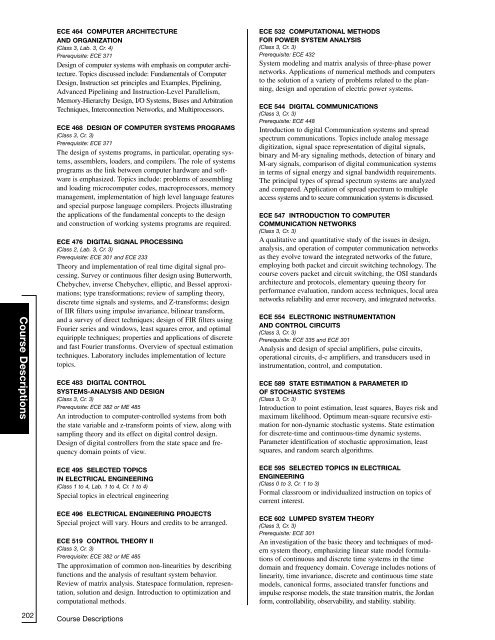ACADEMIC CATALOG - Purdue University Calumet
ACADEMIC CATALOG - Purdue University Calumet
ACADEMIC CATALOG - Purdue University Calumet
Create successful ePaper yourself
Turn your PDF publications into a flip-book with our unique Google optimized e-Paper software.
Course Descriptions<br />
ECE 464 COMPUTER ARCHITECTURE<br />
AND ORGANIZATION<br />
(Class 3, Lab. 3, Cr. 4)<br />
Prerequisite: ECE 371<br />
Design of computer systems with emphasis on computer architecture.<br />
Topics discussed include: Fundamentals of Computer<br />
Design, Instruction set principles and Examples, Pipelining,<br />
Advanced Pipelining and Instruction-Level Parallelism,<br />
Memory-Hierarchy Design, I/O Systems, Buses and Arbitration<br />
Techniques, Interconnection Networks, and Multiprocessors.<br />
ECE 468 DESIGN OF COMPUTER SYSTEMS PROGRAMS<br />
(Class 3, Cr. 3)<br />
Prerequisite: ECE 371<br />
The design of systems programs, in particular, operating systems,<br />
assemblers, loaders, and compilers. The role of systems<br />
programs as the link between computer hardware and software<br />
is emphasized. Topics include: problems of assembling<br />
and loading microcomputer codes, macroprocessors, memory<br />
management, implementation of high level language features<br />
and special purpose language compilers. Projects illustrating<br />
the applications of the fundamental concepts to the design<br />
and construction of working systems programs are required.<br />
ECE 476 DIGITAL SIGNAL PROCESSING<br />
(Class 2, Lab. 3, Cr. 3)<br />
Prerequisite: ECE 301 and ECE 233<br />
Theory and implementation of real time digital signal processing.<br />
Survey or continuous filter design using Butterworth,<br />
Chebychev, inverse Chebychev, elliptic, and Bessel approximations;<br />
type transformations; review of sampling theory,<br />
discrete time signals and systems, and Z-transforms; design<br />
of IIR filters using impulse invariance, bilinear transform,<br />
and a survey of direct techniques; design of FIR filters using<br />
Fourier series and windows, least squares error, and optimal<br />
equiripple techniques; properties and applications of discrete<br />
and fast Fourier transforms. Overview of spectual estimation<br />
techniques. Laboratory includes implementation of lecture<br />
topics.<br />
ECE 483 DIGITAL CONTROL<br />
SYSTEMS-ANALYSIS AND DESIGN<br />
(Class 3, Cr. 3)<br />
Prerequisite: ECE 382 or ME 485<br />
An introduction to computer-controlled systems from both<br />
the state variable and z-transform points of view, along with<br />
sampling theory and its effect on digital control design.<br />
Design of digital controllers from the state space and frequency<br />
domain points of view.<br />
ECE 532 COMPUTATIONAL METHODS<br />
FOR POWER SYSTEM ANALYSIS<br />
(Class 3, Cr. 3)<br />
Prerequisite: ECE 432<br />
System modeling and matrix analysis of three-phase power<br />
networks. Applications of numerical methods and computers<br />
to the solution of a variety of problems related to the planning,<br />
design and operation of electric power systems.<br />
ECE 544 DIGITAL COMMUNICATIONS<br />
(Class 3, Cr. 3)<br />
Prerequisite: ECE 448<br />
Introduction to digital Communication systems and spread<br />
spectrum communications. Topics include analog message<br />
digitization, signal space representation of digital signals,<br />
binary and M-ary signaling methods, detection of binary and<br />
M-ary signals, comparison of digital communication systems<br />
in terms of signal energy and signal bandwidth requirements.<br />
The principal types of spread spectrum systems are analyzed<br />
and compared. Application of spread spectrum to multiple<br />
access systems and to secure communication systems is discussed.<br />
ECE 547 INTRODUCTION TO COMPUTER<br />
COMMUNICATION NETWORKS<br />
(Class 3, Cr. 3)<br />
A qualitative and quantitative study of the issues in design,<br />
analysis, and operation of computer communication networks<br />
as they evolve toward the integrated networks of the future,<br />
employing both packet and circuit switching technology. The<br />
course covers packet and circuit switching, the OSI standards<br />
architecture and protocols, elementary queuing theory for<br />
performance evaluation, random access techniques, local area<br />
networks reliability and error recovery, and integrated networks.<br />
ECE 554 ELECTRONIC INSTRUMENTATION<br />
AND CONTROL CIRCUITS<br />
(Class 3, Cr. 3)<br />
Prerequisite: ECE 335 and ECE 301<br />
Analysis and design of special amplifiers, pulse circuits,<br />
operational circuits, d-c amplifiers, and transducers used in<br />
instrumentation, control, and computation.<br />
ECE 589 STATE ESTIMATION & PARAMETER ID<br />
OF STOCHASTIC SYSTEMS<br />
(Class 3, Cr. 3)<br />
Introduction to point estimation, least squares, Bayes risk and<br />
maximum likelihood. Optimum mean-square recursive estimation<br />
for non-dynamic stochastic systems. State estimation<br />
for discrete-time and continuous-time dynamic systems.<br />
Parameter identification of stochastic approximation, least<br />
squares, and random search algorithms.<br />
202<br />
ECE 495 SELECTED TOPICS<br />
IN ELECTRICAL ENGINEERING<br />
(Class 1 to 4, Lab. 1 to 4, Cr. 1 to 4)<br />
Special topics in electrical engineering<br />
ECE 496 ELECTRICAL ENGINEERING PROJECTS<br />
Special project will vary. Hours and credits to be arranged.<br />
ECE 519 CONTROL THEORY II<br />
(Class 3, Cr. 3)<br />
Prerequisite: ECE 382 or ME 485<br />
The approximation of common non-linearities by describing<br />
functions and the analysis of resultant system behavior.<br />
Review of matrix analysis. Statespace formulation, representation,<br />
solution and design. Introduction to optimization and<br />
computational methods.<br />
Course Descriptions<br />
ECE 595 SELECTED TOPICS IN ELECTRICAL<br />
ENGINEERING<br />
(Class 0 to 3, Cr. 1 to 3)<br />
Formal classroom or individualized instruction on topics of<br />
current interest.<br />
ECE 602 LUMPED SYSTEM THEORY<br />
(Class 3, Cr. 3)<br />
Prerequisite: ECE 301<br />
An investigation of the basic theory and techniques of modern<br />
system theory, emphasizing linear state model formulations<br />
of continuous and discrete time systems in the time<br />
domain and frequency domain. Coverage includes notions of<br />
linearity, time invariance, discrete and continuous time state<br />
models, canonical forms, associated transfer functions and<br />
impulse response models, the state transition matrix, the Jordan<br />
form, controllability, observability, and stability. stability.

















